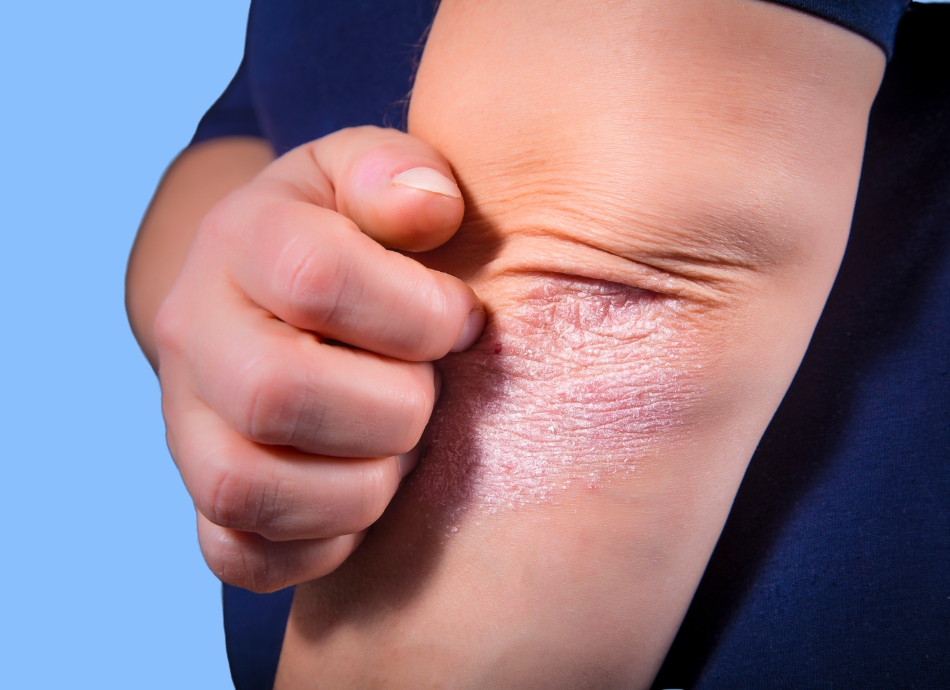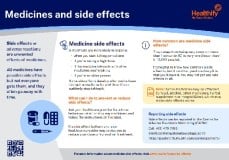If you're a frequent visitor to Healthify, why not share our site with a friend? Don't forget you can also browse Healthify without using your phone data.
Acitretin
Key points about acitretin
- Acitretin is used to treat skin conditions such as severe psoriasis.
- It can cause severe birth defects in pregnant people. Don't take acitretin if you’re pregnant, or if there's a chance you could become pregnant.
- Find out how to take it safely and possible side effects.

Acitretin is used to treat skin conditions such as severe psoriasis. It’s also called Novatretin®.
Acitretin belongs to a group of medicines called retinoids. Retinoids are closely related to vitamin A and work by slowing down cell growth in your skin.
Acitretin is available in Aotearoa New Zealand with a prescription written by a prescriber. Funding in New Zealand requires a Special Authority application.
Note: Acitretin can cause serious side effects such as severe birth defects in pregnant people, low mood and behaviour problems and liver problems. Read more detailed information below about things to consider before you start acitretin and what to know while you're taking acitretin.
In Aotearoa New Zealand acitretin is available as capsules (10 mg or 25 mg).
- Always take your acitretin exactly as your healthcare provider has told you. The pharmacy label on your medicine will tell you how much acitretin to take, how often to take it and any special instructions.
- The dose of acitretin will depend on what it's being used for. Your healthcare provider will tell you which dose is right for you. Depending on how your body responds, your healthcare provider may increase your dose after a few weeks.
- Timing: Acitretin is usually taken once a day, at about the same time each day. Take your acitretin with or just after food.
- Swallow your acitretin capsules whole: Don't split or chew them.
- Missed dose: If you forget to take your dose, take it as soon as you remember that day. But if it's nearly time for your next dose, just take the next dose at the right time. Don't take double the dose.
Acitretin can cause birth defects and is harmful to unborn babies.
- Don’t take acitretin if you’re pregnant or planning a pregnancy.
- If you’re sexually active, ask your doctor about reliable contraceptive options.
Don't take acitretin if you're pregnant, or there's a chance you could become pregnant.
- Before you start acitretin, your healthcare provider may arrange a pregnancy test to ensure that you aren’t pregnant.
- It’s very important to wait 3 years after stopping acitretin before trying to get pregnant.
- If you’re sexually active, you must use at least one reliable method of contraceptive for at least 1 month before you start acitretin, the whole time you’re taking acitretin and for at least 3 years after you finish taking it. Read more about methods of contraception.
- Note: No contraceptive precautions are required for males who are taking acitretin; birth defects have not been identified in children fathered by men who have taken acitretin.
Here are some things to know when you're taking acitretin. Other things may be important as well, so ask your healthcare provider what you should know about.
Dry skin, lips, nostrils and eyes
Acitretin reduces oil production in your skin. It can cause dry skin, dry mouth, chapped lips, dry nostrils and dry eyes. These effects can be uncomfortable. Here are some tips to manage these side effects, but if you have any questions, ask your healthcare provider or pharmacist for advice.
- Lips: From the start of treatment, use an emollient lip balm that has a sunscreen in it. It's important to apply the lip balm often during the day, such as in the morning as soon as you wake up, after any food, snack or drink, last thing at night and any other time in between that your lips become dry.
- Skin: From the start of treatment, use a non-perfumed moisturising cream. Use non-soap cleansers, as these are less likely to irritate your skin compared with a soap cleanser. Avoid beauty treatments such as chemical peels, dermabrasion and waxing during treatment, and for at least 6 months after stopping.
- Eyes: Your eyes may become dry and itchy, especially if you wear contact lenses. Ask your pharmacist to recommend a suitable eye lubricant (also called artificial tears). Read more about eye lubricants. While you're taking acitretin, you may need to wear glasses instead of contact lenses.
- Nostrils: The inside of your nostrils may become dry and crusted and lead to mild nosebleeds. Applying a thin layer of petroleum jelly gently to the inside of the nose may help.
Increased sensitivity to the sun
Acitretin can make you more sensitive to the sun and your skin is more likely to burn.
- Avoid using sunbeds and unnecessary sun exposure.
- When outside, protect your skin by using an oil-free sunscreen (SPF50+). Apply the sunscreen to all areas especially your face, neck and ears. Read more about using sunscreen.
- Wear clothing that protects you from the sun.
- Wear sunglasses when outdoors.
Changes in mood and behaviour
There have been reports of depression, low mood and behaviour changes from some people taking acitretin. Special care is needed if you have a history of depression. Contact your healthcare provider immediately if you experience any changes in your mood, become withdrawn, have distressing thoughts, or feelings about suicide or harming yourself, or you're feeling sad, anxious, worthless or hopeless.
Your vision may be affected
Your vision may be affected by acitretin, especially your night vision. Make sure you know how you react to acitretin capsules before you drive a car, operate machinery or do anything else that might be dangerous if your vision is affected.
Other things to know:
- Avoid alcohol: Avoid alcohol while you’re taking acitretin and for 2 months after finishing treatment.
- Breastfeeding: Don't take acitretin if you're breastfeeding.
- Blood donation: Don't donate blood while taking acitretin and for 3 years after stopping it.
- Monitoring: Before you start treatment and during treatment, your healthcare provider will send you for blood tests to check your liver, blood fats and blood count.
- Keep taking acitretin regularly: Most people notice an improvement in their skin condition after a few weeks, but it may take 2–3 months before you notice the full benefits of acitretin.
- You may notice your psoriasis getting worse (more red and itchy) when you first start taking acitretin, but this settles with time.
- Other medicines: Acitretin interacts with some medicines such as some antibiotics and vitamin A products (including multivitamins), herbal supplements and rongoā Māori. Check with your healthcare provider or pharmacist before starting acitretin and before starting any new products.
- Avoid waxing for hair removal: Acitretin can make your skin more sensitive. Avoid waxing (using hot or cold wax), laser and other treatments while taking this medicine and for 3 to 6 months after stopping.
Like all medicines, acitretin can cause side effects, although not everyone gets them. If you're concerned about any symptoms you think might be related to your medicine, talk to your healthcare provider. The following information offers some guidance but doesn't include all possible side effects.
Common side effects
Tell your healthcare provider if these side effects bother you:
- Dry skin, lips, eyes and nostrils. Blurry vision, especially at night. Increased skin sensitivity to the sun, and in general. Read more about these in the section ‘What to know while you are taking acitretin’ above.
- Itchy skin.
- Hair thinning or loss.
- Nail problems.
- Headache.
- Feeling tired.
- Muscle aches.
Tell your healthcare provider immediately or phone Healthline free on 0800 611 116 if these occur
- Mood changes, anxiety, depression or worsening depression, low mood, aggressive tendencies, thoughts or talk of suicide and self-harm.
- Severe headache, blurred or changes in vision, pounding in one or both ears.
- Signs of problems with your liver, such as pains in your stomach, loss of appetite or yellowing of your skin and eyes.
- Severe diarrhoea (runny poo), especially if it contains blood.
- Bone pain, morning stiffness and reduced range of motion.
Read more about medicines and side effects and reporting a reaction you think might be a side effect.
The following links provide further information on acitretin:
Acitretin(external link) New Zealand Formulary Patient Information
Novatretin(external link) Consumer Information Sheet, Medsafe NZ
Acitretin(external link) DermNet NZ
Brochures
Plaque psoriasis – my options when topical treatments aren't enough – decision aid(external link) NPS MedicineWise, Australia, 2021
Medicines and side effects(external link) Healthify He Puna Waiora, NZ, 2024
5 questions to ask about your medications(external link) Health Quality and Safety Commission, NZ, 2019 English(external link), te reo Māori(external link)
References
- Acitretin(external link) NZ Formulary, NZ
- Novatretin(external link) Medsafe datashet, NZ
- Avoid teratogenic medicines in pregnancy(external link) Medsafe, NZ, 2021
- Monitoring patients with moderate to severe psoriasis(external link) BPAC, NZ, 2021
- Systemic retinoids and diffuse idiopathic skeletal hyperostosis (DISH)(external link) Medsafe, NZ, 2025
Brochures

Plaque psoriasis – my options when topical treatments aren't enough – decision aid
NPS MedicineWise, Australia, 2021

Medicines and side effects
Healthify He Puna Waiora, NZ, 2024

Health Quality and Safety Commission, NZ, 2019
English, te reo Māori
Credits: Healthify editorial team. Healthify is brought to you by Health Navigator Charitable Trust.
Reviewed by: Stephanie Yee, Pharmacist, Auckland.
Last reviewed:





